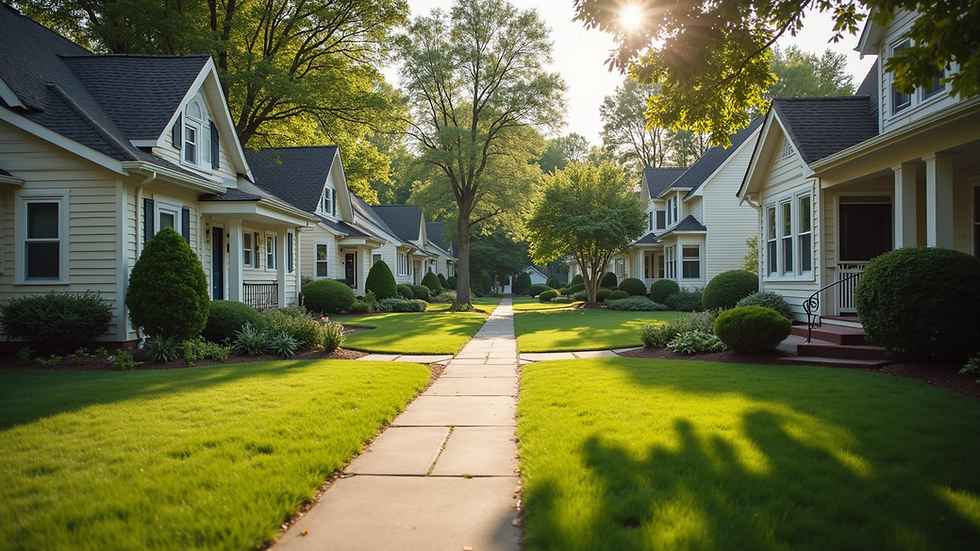How to Navigate the Steps of Buying Your First Home: A Comprehensive Guide for First-Time Home Buyers
- Karen O'Neil
- Mar 21, 2025
- 4 min read
Updated: Jul 9, 2025
Buying your first home is not just a dream; it’s a significant milestone in life filled with excitement and challenges. For many, the process can feel overwhelming, but breaking it down step by step makes it manageable. This guide will walk you through each stage of the home-buying journey, helping you to make informed decisions along the way.
Assess Your Finances
Before diving into real estate, take a close look at your financial situation. Start by reviewing your budget, savings, and credit score to understand your purchasing power.
Ideally, aim to save at least 20% of the home price for the down payment to avoid Private Mortgage Insurance (PMI), which can add 0.5% to 1% of the loan amount to your annual costs. Also, set aside additional funds for closing costs, which typically range from 2-5% of the home price, and remember to plan for repairs and upgrades after you move in.

Understanding your credit score is vital. A strong score (generally 740 or above) can secure you better interest rates, potentially saving you thousands over the life of your mortgage. If your score is low, consider strategies to improve it, such as paying down debts or disputing mistakes in your credit report.
Get Pre-Approved for a Mortgage
With a clear financial picture, the next critical step is getting pre-approved for a mortgage.
Pre-approval means lenders evaluate your financial health and let you know how much they are willing to lend. This not only clarifies your price range but also shows sellers you are a serious buyer, which can be a significant advantage in competitive markets.

Shop around and compare offers from at least three to five lenders. Look for competitive interest rates, favorable loan terms, and any hidden fees. According to recent statistics, even a 0.5% difference in interest can add up to over $30,000 in total interest paid on a $300,000 loan over 30 years.
Find a Real Estate Agent
Choosing the right real estate agent is another vital step. An experienced agent can provide insights into your desired neighborhoods and help simplify the buying process.
When looking for an agent, consider their experience level, familiarity with your target area, and communication style. You want someone who listens to your needs and communicates clearly. Select someone with at least three to five years of experience and positive reviews from past clients.
Trust your gut during interviews, and don’t hesitate to ask for references. A good agent's expertise can be the key to a successful buying experience.
Start House Hunting
Now comes the exciting part—house hunting!
Begin by listing your must-haves versus nice-to-haves. Essential factors may include the number of bedrooms and bathrooms, outdoor space, and proximity to work or schools.

As you tour homes, be practical and take thorough notes. Look for features you love and those that don’t meet your expectations. Your agent can assist in scheduling tours and may have insights about properties that are not yet listed.
Make an Offer
Once you've found a home that meets your needs, it’s time to make an offer. Collaborate closely with your real estate agent to develop a competitive proposal that aligns with the current market conditions and the home's value.
Consider the home's asking price, how long it has been on the market, and any previous offers. Your agent's negotiating skills can help you find a price that is fair for both you and the seller.
Complete Inspections and Appraisals
After your offer is accepted, it's time to complete home inspections and appraisals.
Home inspections are crucial for identifying any hidden problems that may need fixing. Inspectors evaluate key systems like the home’s foundation, electrical wiring, plumbing, and roofing.
Simultaneously, an appraisal is conducted to determine the home’s market value, ensuring you are not overpaying. Lenders typically require this assessment to proceed with your mortgage approval. Remember, a typical house inspection may cost between $300 and $500, but the peace of mind it provides is invaluable.
Finalize Your Purchase
The final step is closing the deal. Here is where you secure your mortgage and complete the paperwork to own your new home.
Be prepared for closing costs, often amounting to 2-5% of the purchase price. Understand all the documents you are signing; ask your agent or lender if you have any questions.
Once you sign, transfer funds, and receive your keys, you are officially a homeowner!
Wrapping Up the Home-Buying Journey
Buying your first home can feel overwhelming, but it is also a rewarding experience. By carefully planning and understanding each step, you can make the process smoother and more enjoyable. Keep your finances organized, get pre-approved for a mortgage, select a capable real estate agent, and tackle each phase with confidence.
For tailored guidance and updates, reach out or subscribe for valuable tips aimed at first-time home buyers. Let's make your home-buying journey a success!
Happy house hunting!



Comments